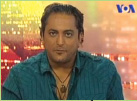|
In an interview with Supreme
Master Television, he recounts, “When an artist, for the
first time, goes on the stage and sees all the people, and the
connection you find with them, and you find yourself so comfortable
with the stage, then you know that’s what God meant for
you to do. And I always wanted to preach through my music peaceful,
happy love songs. And I’m blessed and thankful that I
can do this. It’s something I love.”
A true pioneer, Siavash Shams modernized Middle Eastern/Persian
music by adopting traditional melodies and lyrics and blending
them with Western rhythms. His work has inspired a whole generation
of Iranian pop and R&B artists. He shares the secret to
his musical success as follows: “Just open your eyes and
heart, and follow it. As one quote from a movie says: ‘Your
heart is free, just follow it.’ And life has so much,
so much to talk about. That’s how I’ve been doing
my work.”
 |
Bestselling
debut album Hamsayehaa
|
One of the few Persian artists to write his own songs,
Siavash Shams has produced seven successful albums, primarily
about love, and has sold over one million copies of his albums
worldwide. He has performed at sold-out venues around the globe.
His hit song “Dokhtar Irouni” made him a household
name overnight and his album Sahneh solidified his place
in Persian music history. The Daily Star newspaper named
Siavash Shams one of the most popular non-religious singers
in Iran. In response to his meteoric success, the star had humbly
shared, “Music, it breaks all the barriers, all those
things that actually we need to break. Through music it is possible
to give hope to people. When I see people write to me that because
of me and my music, my interviews, they kind of found salvation,
peace, and they didn’t get into drugs or they let go of
addiction, or, you know, [gained] a sense of family and all
the other things, that makes me happy. If I make a difference
in one person’s life, I think that’s what it is
all about. If everybody does that, [help] one person, I think
we will have a beautiful world.”
 |
Siavash
Shams is an all-time favorite Iranian pop singer/songwriter
with fans worldwide.
|
The Persian music legend also has a big heart for
good causes. In 2006, Siavash Shams and his wife Caroline adopted
Noah Johan Shams, a beautiful baby of Mexican/Guatemalan heritage.
In 2008, the couple welcomed a second adopted child, Rocco Cyrus
Shams, into their family. “Now that I have my children,
I'm in need of them more than anything in life. And without
them, I could not breathe really. That's how beautiful they
are. Beyond anything in life, I think no child should stay without
parents in the world, and we can achieve that.”
Siavash Sham’s outlook on life includes “getting
out of yourself and doing more with what God gave you: power,
money, fame. It's the only reason I think God gives you those
things, is to help others, or else it's just a walk to nothingness,
emptiness, and you are never going to find true happiness.”
This openness to using his God-given talents for
a greater good seems to have led him on the path to participating
in Loving the Silent Tears.
For the Middle East number in the musical, Siavash
Shams was joined by two young and talented female singers, Liel
Kolet from Israel and Lebanese-Palestinian vocalist Camellia
Abou-Odah, in performing the powerful song, titled “Truth,
Ego, Soul and Blessings,” based on the poetry of Supreme
Master Ching Hai. The music was composed by Emmy winner Doug
Katsaros (Footloose) with Siavash Shams composing the
music for the stanzas to be sung in Persian. Mr. Shams stated,
“When you bring so many different cultures together, there
is an energy that is kind of hard to describe, especially when
the lyrics and the vibe is so positive, about peace, love, humanity.”
There were three groups of dancers on stage all around
the trio of singers, each distinctly dancing in Persian, Arab
and Jewish styles, yet beautifully in harmony with one another.
Siavash Shams opened the Middle Eastern section with
the first stanza, which he translated into Farsi language and
adapted to Persian classical modal music, in order to best convey
the deep message of the poem.
Liel Kolet and Camellia Abou-Odah then sang other
verses of the piece in both English as well as their native
languages, Hebrew and Arabic.
About the song, Siavash Shams stated, “I
believe my vision on it: When you think about the Supreme
Being, God that is in everybody’s heart, it really
goes beyond anything else. I know we love our children,
our wives, and our family, our friends and everything.
But there is a power above all this that makes this
all happen. All we have to do is seek in our heart and
we will find it. And I think it is a great, great song
and great lyrics.”
 
 “It
was an honor to be “It
was an honor to be
 part
of this show. It was a part
of this show. It was a 
 magical
and life-changing magical
and life-changing
 experience.” experience.”
—
Siavash Shams, Persian superstar

Summing up the Loving the Silent Tears musical,
he added, “Supreme Master Ching Hai wrote very
nice poems about life and love and peace. It’s
about finding peace and finding God within yourself,
and something above all the love we have in this life.
I think when you are not self-centered and can erase
selfishness, then you can grow. We could build a better,
peaceful world together.”
With the theme of the musical being one of
peace, the event promoted the concept of harmony among
all beings, including animals, through the compassionate
vegan diet. Mr. Shams remarked, “Actually, I’ve
been loving it so much that I am thinking about, really
me and my wife, we’re thinking about going vegetarian,”
he added, “I’d really love to go vegan because
of the fact that it will save nature, species, the beautiful
Earth.” |

With an estimated
global audience of 123 million people, Voice
of America (VOA) is the US government’s
international broadcasting service. VOA-Iran
had substantial coverage of the musical with
an interview with Siavash Shams prior to the
musical as well as another post-event feature.
Following
is an excerpt from Mr. Shams’ live interview
which also included questions from the audience.
VOA: Another
person is asking: In the past, Siavash sang songs
in English and Spanish.
Is he happy with the results?
Will he be singing this kind of song in the future?
 |
Interview
on
Voice of America |
Siavash
Shams: As you know, there
will be a very big show, a musical, at the
Shrine Auditorium on October 27, and they
invited me to be the singer from Iran and
all of that work is in English. This is good
for Iran and for being Iranian. I think it
is important when something, somebody can
shed some positive light on Iran. And I have
always loved to do this kind of work, because
I grew up here and write in many languages.
VOA: Could
you describe your part a little bit and what
the show is about?
Siavash
Shams: You see, Loving
the Silent Tears is the name of the
show. It has the message of peace and love.
And the group that is doing this, is a
positive one, and when they invited me,
because very famous artists are involved
in it too, Grammy winners like Jody Watley.
And many other people from other countries
are coming here to perform, I was very
happy that they invited me. And their purpose
is good and that’s why I will be
there.
VOA: We
will surely try to make a program about the show
and air it on Shabahang so viewers and your fans
know what the show is about.
|
Keen media interest
on Siavash Shams'
participation in the musical |
|
|
Prior to the show, Siavash Shams had expressed, “I
thank everybody that is involved working so hard for making
it happen. It's beautiful. It is a hard work. But it is very
good because politics makes walls and we can break them with
music. I will give my hundred percent for this musical. And
I hope I can do justice to it.”
Based on the overwhelming applause of the 6,000-plus
audience as well as the heartfelt feedback for the song, “Truth,
Ego, Soul and Blessings,” it was evident that Siavash
Shams, along with Liel Kolet and Camellia Abou-Odah, did give
their all in the performance, deeply touching all listeners.

|